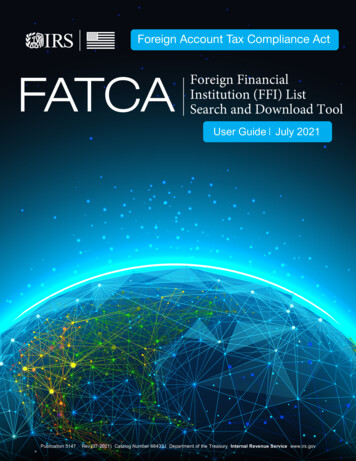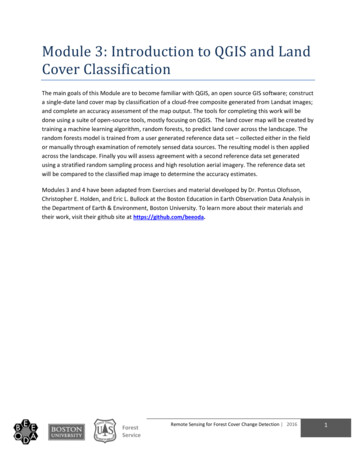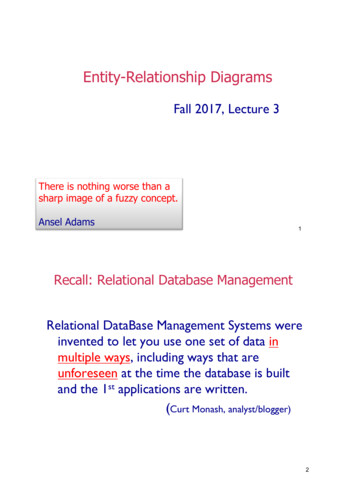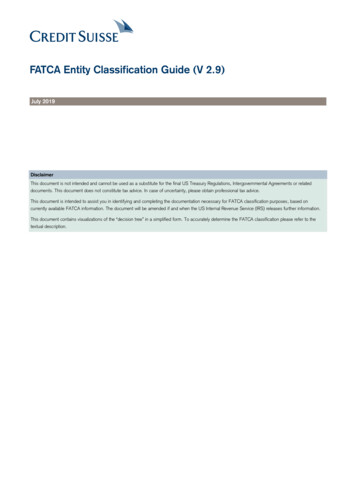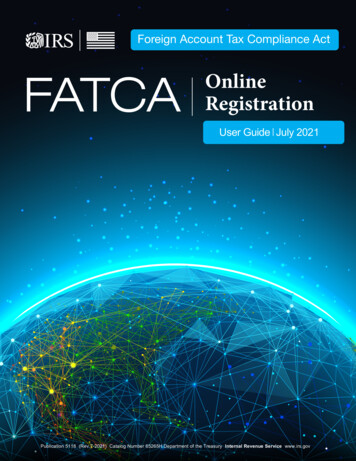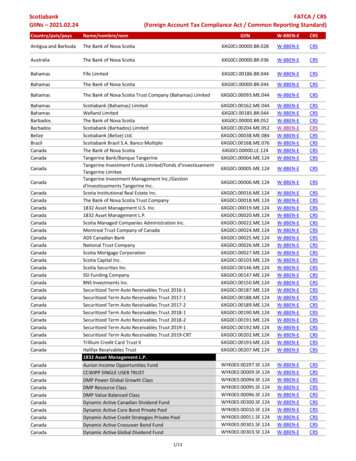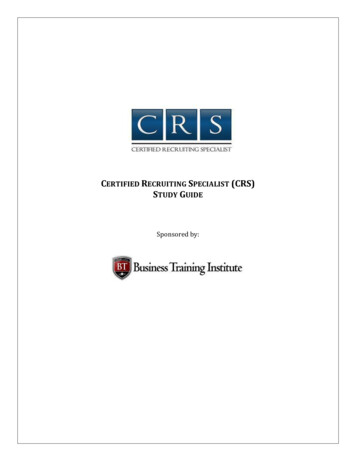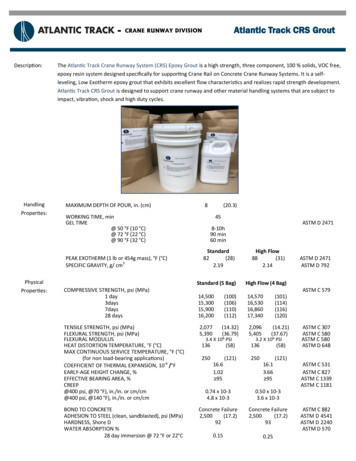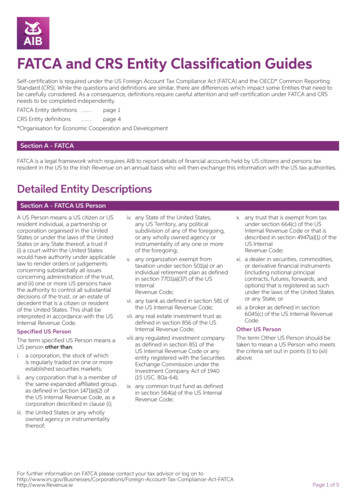
Transcription
FATCA and CRS Entity Classification GuidesSelf-certification is required under the US Foreign Account Tax Compliance Act (FATCA) and the OECD* Common ReportingStandard (CRS). While the questions and definitions are similar, there are differences which impact some Entities that need tobe carefully considered. As a consequence, definitions require careful attention and self-certification under FATCA and CRSneeds to be completed independently.FATCA Entity definitions page 1CRS Entity definitionspage 4 *Organisation for Economic Cooperation and DevelopmentSection A - FATCAFATCA is a legal framework which requires AIB to report details of financial accounts held by US citizens and persons taxresident in the US to the Irish Revenue on an annual basis who will then exchange this information with the US tax authorities.Detailed Entity DescriptionsSection A - FATCA US PersonA US Person means a US citizen or USresident individual, a partnership orcorporation organised in the UnitedStates or under the laws of the UnitedStates or any State thereof, a trust if(i) a court within the United Stateswould have authority under applicablelaw to render orders or judgementsconcerning substantially all issuesconcerning administration of the trust,and (ii) one or more US persons havethe authority to control all substantialdecisions of the trust, or an estate ofdecedent that is a citizen or residentof the United States. This shall beinterpreted in accordance with the USInternal Revenue Code.Specified US PersonThe term specified US Person means aUS person other than:i. a corporation, the stock of whichis regularly traded on one or moreestablished securities markets;ii. any corporation that is a member ofthe same expanded affiliated group,as defined in Section 1471(e)(2) ofthe US Internal Revenue Code, as acorporation described in clause (i);iv. any State of the United States,any US Territory, any politicalsubdivision of any of the foregoing,or any wholly owned agency orinstrumentality of any one or moreof the foregoing;x. any trust that is exempt from taxunder section 664(c) of the USInternal Revenue Code or that isdescribed in section 4947(a)(1) of theUS InternalRevenue Code;v. any organization exempt fromtaxation under section 501(a) or anindividual retirement plan as definedin section 7701(a)(37) of the USInternalRevenue Code;xi. a dealer in securities, commodities,or derivative financial instruments(including notional principalcontracts, futures, forwards, andoptions) that is registered as suchunder the laws of the United Statesor any State; orvi. any bank as defined in section 581 ofthe US Internal Revenue Code;vii. any real estate investment trust asdefined in section 856 of the USInternal Revenue Code;viii. any regulated investment companyas defined in section 851 of theUS Internal Revenue Code or anyentity registered with the SecuritiesExchange Commission under theInvestment Company Act of 1940(15 USC. 80a-64);xii. a broker as defined in section6045(c) of the US Internal RevenueCode.Other US PersonThe term Other US Person should betaken to mean a US Person who meetsthe criteria set out in points (i) to (xii)above.ix. any common trust fund as definedin section 584(a) of the US InternalRevenue Code;iii. the United States or any whollyowned agency or instrumentalitythereof;For further information on FATCA please contact your tax advisor or log on nue.iePage 1 of 5
Section A - FATCA Non-Financial Foreign Entity (NFEE)Non-Financial Foreign Entity (NFFE):Entities which are non-US Entities, and arenot Financial Institutions will be regardedas being an NFFE. Each NFFE must beclassified as either an Active NFFE or aPassive NFFE.An Active NFFEAn NFFE will be regarded as an ActiveNFFE if it meets any one of the following:a. Less than 50 per cent of the NFFE’sgross income for the precedingcalendar year or other appropriatereporting period is passive incomeand less than 50 per cent of theassets held by the NFFE during thepreceding calendar year or otherappropriate reporting period areassets that produce or are held for theproduction of passive income;b. The stock of the NFFE is regularlytraded on an established securitiesmarket or the NFFE is a Related Entityof an Entity the stock of which istraded on an established securitiesmarket;c. The NFFE is organised in a USTerritory and all of the owners of thepayee are bona fide residents of thatUS Territory;d. The NFFE is a non-US government,a government of a US Territory, aninternational organization, a non-UScentral bank of issue, or an Entitywholly owned by one or more of theforegoing;e. Substantially all of the activities of theNFFE consist of holding (in whole orin part) the outstanding stock of, andproviding financing and services to,one or more subsidiaries that engagein trades or businesses other thanthe business of a Financial Institution,except that an NFFE shall not qualifyfor this status if the NFFE functions(or holds itself out) as an investmentfund, such as a private equity fund,venture capital fund, leveragedbuyout fund or any investment vehiclewhose purpose is to acquire or fundcompanies and then hold interests inthose companies as capital assets forinvestment purposes;f. The NFFE is not yet operating abusiness and has no prior operatinghistory, but is investing capital intoassets with the intent to operate abusiness other than that of a FinancialInstitution; provided, that the NFFEshall not qualify for this exception afterthe date that is 24 months after thedate of the initial organisation of theNFFE;g. The NFFE was not a FinancialInstitution in the past five years, and isin the process of liquidating its assetsor is reorganising with the intent tocontinue or recommence operationsin a business other than that of aFinancial Institution;h. The NFFE primarily engages infinancing and hedging transactionswith or for Related Entities that are notFinancial Institutions, and does notprovide financing or hedging servicesto any Entity that is not a RelatedEntity, provided that the group ofany such Related Entities is primarilyengaged in a business other than thatof a Financial Institution;i. The NFFE meets all of the followingrequirements:i. It is established and maintained in itscountry of residence exclusively forreligious, charitable, scientific, artistic,cultural, or educational purposes;ii. It is exempt from income tax in itscountry of residence;iii. It has no shareholders or memberswho have a proprietary or beneficialinterest in its income or assets;For further information on FATCA please contact your tax advisor or log on nue.ieiv. T he applicable laws of the Entity’scountry of residence or the Entity’sformation documents do notpermit any income or assets ofthe Entity to be distributed to,or applied for the benefit of, aprivate person or non-charitableEntity other than pursuant to theconduct of the Entity’s charitableactivities, or as payment ofreasonable compensation forservices rendered, or as paymentrepresenting the fair market valueof property which the Entity haspurchased; andv. The applicable laws of the Entity’scountry of residence or the Entity’sformation documents requirethat, upon the Entity’s liquidationor dissolution, all of its assets bedistributed to a governmental Entityor other non-profit organization, orescheat to the government of theEntity’s country of residence or anypolitical subdivision thereof.j. Any NFFE within the definition ofan Excepted NFFE in US TreasuryRegulations.A Passive NFFEA Passive NFFE is any NFFE that is not:(i) an Active NFFE or (ii) a WithholdingForeign Partnership, WithholdingForeign Trust, or a Qualified Intermediarypursuant to relevant US TreasuryRegulations.Page 2 of 5
Section A - FATCA Financial InstitutionsThe term “Financial Institution” meansa Custodial Institution, a DepositoryInstitution, an Investment Entity or aSpecified Insurance Company.Deemed Compliant Financial InstitutionAn entity will be deemed compliant if itis listed in Part II of Annex II to the Irish– US Inter-Governmental Agreement(IGA) or is within the definition of aDeemed Compliant FFI set out in the USRegulations. There are two categories ofdeemed compliant institutions – selfcertified or registered.Certified Deemed CompliantInstitutionsi) Certified Deemed CompliantFinancial Institutions listed in theAgreement Non Profit Organisations(Charitable organisations thatqualify for exemption from taxin accordance with section 848Aand Schedule 26A of the TaxesConsolidation Act 1997, or bodiesestablished for the promotionof athletic or amateur games orsports that have been grantedexemption from tax in accordancewith section 235 of the TaxesConsolidation Act 1997 by theRevenue Commissioners). Financial Institutions with a localclient base which meets all of theconditions set out in Annex II ofthe IGA , and Certain Collective InvestmentVehicles.ii) Certified Deemed CompliantFinancial Institutions listed in the USRegulations Non registering local banks, Financial Institutions with only lowvalue accounts, Sponsored closely held investmentvehicles, Limited Life debt investmententities, Owner documented FinancialInstitutions,iii) Certain Investment advisors andInvestment Managers.Registered Deemed CompliantFinancial InstitutionsThe Financial Institutions falling withinthis category are not included asDeemed Compliant Financial Institutionsunder the IGA. However the institutionsare regarded as Registered DeemedCompliant Financial Institutions underthe US Regulations. As such paragraph1(q) of Article 1 of the Agreementenables Irish Financial Institutions thatcomply with the various conditions toqualify for the exemption. Institutionsfalling within this category are: Non-reporting members of a groupof related Participating FinancialInstitutions, Restricted funds, Qualified credit card issuers, Sponsored investment entities, or Controlled foreign corporations.Partner Jurisdiction Financial InstitutionThe term “Partner Jurisdiction FinancialInstitution” means (i) any FinancialInstitution resident in a PartnerJurisdiction (including Ireland and theUK), but excluding any branches of suchFinancial Institution that are locatedoutside the Partner Jurisdiction, and(ii) any branch of a Financial Institutionnot resident in the Partner Jurisdiction,if such branch is located in the PartnerJurisdiction.Partner JurisdictionThe term “Partner Jurisdiction” meansa jurisdiction that has in effect anagreement with the United States tofacilitate the implementation of FATCA.Exempt Beneficial OwnerThe term “Exempt Beneficial Owner”means:i. a Governmental Entity;ii. an International Organisation(examples of which include TheInternational Monetary Fund, TheWorld Bank, The International Bankfor Reconstruction and Developmentand The European Community – fora full list please see the relevantguidance issued by Irish Revenue, orthe IRS);iii. a Central Bank;iv. a Pension trust or otherorganisations, as referred to in Article4(1) (c) of the 1997 Double TaxationTreaty between Ireland and theUnited States of America, establishedin Ireland and maintained exclusivelyto administer or provide retirementor employee benefits; orv. any other entity defined as anExempt Beneficial Owner in USTreasury Regulations.Non-participating Financial InstitutionThe term “Non-participating FinancialInstitution” means a non-participatingFFI, as that term is defined in relevantUS Treasury Regulations, but does notinclude an Irish Financial Institutionor other Partner Jurisdiction FinancialInstitution other than a FinancialInstitution identified as a Nonparticipating Financial Institutionpursuant to paragraph 2 of Article 5of the Irish – US Inter GovernmentalAgreement.Participating Financial InstitutionA Participating Foreign FinancialInstitution is a Financial Institution whichhas entered into an FFI agreement withthe Internal Revenue Service (IRS) undersection 1471(b) of the Internal RevenueCode and § 1.1471-4 of the TreasuryRegulations 1 (the FFI agreement) to betreated as a participating FFI.For further information on FATCA please contact your tax advisor or log on nue.iePage 3 of 5
Section B - CRSCRS is a legal framework which requires AIB to report details of financial accounts held by reportable persons (i.e. customerswho are not tax resident in the Republic of Ireland or the US) to the Irish Revenue on an annual basis who will then exchangethis information with tax authorities in relevant jurisdictions.Section B - CRS Non Financial EntityAn Active NFEThe term Active NFE means any of thefollowing: Active NFEs by reason of incomeand assets:º For the preceding calendar yearor other appropriate reportingperiod, less than 50% of its grossincome is passive income (includingdividends, interest, annuities andrent) AND less than 50% of itsassets are held for the productionof passive income. It is expectedthat the majority of organisationswill fall into the Active NFEcategory. Certain Wholly Owned Entities:º An Entity wholly owned byone or more of the following:Governmental Entity, InternationalOrganisation, Central Bank. Holding NFEs that are members of anonfinancial group:º Substantially all of the activitiesof the NFE consist of holding (inwhole or in part) the outstandingstock of, or providing financingand services to, one or moresubsidiaries that engage in tradesor businesses other than thebusiness of a Financial Institution,except that an Entity does notqualify for this status if the Entityfunctions (or holds itself out) as aninvestment fund, such as a privateequity fund, venture capital fund,leveraged buyout fund, or anyinvestment vehicle whose purposeis to acquire or fund companiesand then hold interests in thosecompanies as capital assets forinvestment purposes. Start-up NFEs:º The NFE is not yet operatinga business and has no prioroperating history, but is investingcapital into assets with the intent tooperate a business other than thatof a Financial Institution, providedthat the NFE does not qualify forthis exception after the date thatis 24 months after the date of theinitial organisation of the NFE. NFEs that are liquidating oremerging from bankruptcy:º The NFE was not a FinancialInstitution in the past five years,and is in the process of liquidatingits assets or is reorganising with theintent to continue or recommenceoperations in a business other thanthat of a Financial Institution. Treasury centres that are membersof a nonfinancial group:º The NFE primarily engages infinancing and hedging transactionswith, or for, Related Entities that arenot Financial Institutions, and doesnot provide financing or hedgingservices to any Entity that is not aRelated Entity, provided that thegroup of any such Related Entitiesis primarily engaged in a businessother than that of a FinancialInstitution. Non-profit NFEs:º The NFE meets all of the followingrequirements:- It is established and operatedin its jurisdiction of residenceexclusively for religious,charitable, scientific, artistic,cultural, athletic, or educationalpurposes; or it is established andoperated in its jurisdiction ofresidence and it is a professionalorganisation, business league,chamber of commerce, labourorganisation, agricultural orhorticultural organisation, civicleague or an organisationoperated exclusively for thepromotion of social welfare;- It is exempt from income tax in itsjurisdiction of residence;- It has no shareholders ormembers who have a proprietaryor beneficial interest in its incomeor assets;- The applicable laws of the NFE’sjurisdiction of residence or theNFE’s formation documents donot permit any income or assetsof the NFE to be distributed to,or applied for the benefit of, aprivate person or non-charitableEntity other than pursuant to theconduct of the NFE’s charitableactivities, or as payment ofreasonable compensationfor services rendered, or aspayment representing the fairmarket value of property whichthe NFE has purchased; and- The applicable laws of the NFE’sjurisdiction of residence or theNFE’s formation documentsrequire that, upon the NFE’sFor further information on CRS please contact your tax advisor or log on on or dissolution, allof its assets be distributedto a Governmental Entity orother non-profit organisation,or escheat to the governmentof the NFE’s jurisdiction ofresidence or any politicalsubdivision thereof.The term Governmental Entity meansthe government of a jurisdiction, anypolitical subdivision of a jurisdiction(which, for the avoidance of doubt,includes a state, province, county, ormunicipality), or any wholly ownedagency or instrumentality of ajurisdiction or of any one or more ofthe foregoing (each, a ‘GovernmentalEntity’). This category is comprisedof the integral parts, controlledentities, and political subdivisions of ajurisdiction. An ‘integral part’ of ajurisdiction means any person,organisation, agency, bureau,fund, instrumentality, or otherbody, however designated, thatconstitutes a governing authorityof a jurisdiction. The net earningsof the governing authority must becredited to its own account or toother accounts of the jurisdiction,with no portion inuring to thebenefit of any private person. Anintegral part does not include anyindividual who is a sovereign, official,or administrator acting in a private orpersonal capacity. A controlled entity means anEntity that is separate in form fromthe jurisdiction or that otherwiseconstitutes a separate juridical entity,provided that:º the Entity is wholly ownedand controlled by one or moreGovernmental Entities directly orthrough one or more controlledentities;º the Entity’s net earnings arecredited to its own account orto the accounts of one or moreGovernmental Entities, with noportion of its income inuring to thebenefit of any private person; andº the Entity’s assets vest in one ormore Governmental Entities upondissolution. Income does not inure to the benefitof private persons if such personsare the intended beneficiaries of agovernmental programme, and thePage 4 of 5
Section B - CRS Non Financial Entity continuedprogramme activities are performedfor the general public with respectto the common welfare or relate tothe administration of some phaseof government. Notwithstandingthe foregoing, however, incomeis considered to inure to thebenefit of private persons if theincome is derived from the use ofa governmental entity to conducta commercial business, such as acommercial banking business, thatprovides financial services to privatepersons.The term International Organisationmeans any international organisation orwholly owned agency or instrumentalitythereof. This category includes anyintergovernmental organisation(including a supranational organisation); that is comprised primarily ofgovernments; that has in effect a headquarters orsubstantially similar agreement withthe jurisdiction; and the income of which does not inureto the benefit of private persons.The term Central Bank means aninstitution that is by law or governmentsanction the principal authority,other than the government of thejurisdiction itself, issuing instrumentsintended to circulate as currency.Such an institution may include aninstrumentality that is separate fromthe government of the jurisdiction,whether or not owned in whole or inpart by the jurisdiction.The term Corporation, the stockof which is regularly traded on anestablished securities market or aCorporation that is the Related Entityof such a Corporation means an entitywhich is excluded from the definition ofa “Reportable Person” which is either: A corporation the stock of whichis regularly traded on one or moreestablished securities markets; or Any corporation that is a RelatedEntity of a corporation, the stock ofwhich is regularly traded on one ormore established securities markets.A Passive NFEThe term Passive NFE means any NFEthat is: Not an Active NFE.that primarily conducts as a businessone or more of the following activitiesor operations for or on behalf of acustomer: trading in money market instruments(cheques, bills, certificates of deposit,derivatives, etc.); foreign exchange;exchange, interest rate and indexinstruments; transferable securities;or commodity futures trading; individual and collective portfoliomanagement; or otherwise investing, administering,or managing Financial Assets ormoney on behalf of other persons;orAn entity will be an investment entityif it is investing on its own account,is managed by a financial institutionAND meets the Financial Assets test asdescribed belowAn entity meets the Financial Assetstest if its gross income is primarilyattributable to investing, reinvestingor trading in Financial Assets. This testrequires that at least 50% of the entity’sincome is attributable to investing,reinvesting or trading in Financial Assetsin the shorter of: The three year period ending on 31December in the year preceding thatin which its status as in investmententity is to be determined; or The period in which the entity hasbeen in existenceThe term Investment Entity as listed inSection B 2(b) means an Entity whichmeets the following conditions is not resident in a ParticipatingJurisdiction or does not have abranch located in a ParticipatingJurisdiction; and its gross income is primarilyattributable to investing, reinvesting,or trading in Financial Assets; and is managed by a Financial Institutionas described in 1(a).The term Participating Jurisdictionmeans: any EU Member State; any other jurisdiction (i) with whichIreland has a competent authorityagreement in place with, and (ii)which is identified in a list publishedby Irish Revenue and notified to theEuropean Commission; and any other jurisdiction (i) withwhich the European Union has acompetent authority agreementwith, and (ii) which is identified ina list published by the EuropeanCommission.The term Competent AuthorityAgreement means the agreementwhich provides for the automaticexchange of information between 2jurisdictions in accordance with CRS.Section B - CRS Financial InstitutionThe term Financial Institution meansa Depository Institution, a CustodialInstitution, an Investment Entity, or aSpecified Insurance Company.The term Depository Institution meansany Entity that accepts deposits in theordinary course of a banking or similarbusiness.The term Custodial Institution meansany Entity that holds, as a substantialportion of its business, Financial Assetsfor the account of others. An Entityholds Financial Assets for the accountof others as a substantial portion of itsbusiness if the Entity’s gross incomeattributable to the holding of FinancialAssets and related financial servicesequals or exceeds 20% of the Entity’sgross income during the shorter of: the three-year period that endson 31 December (or the final dayof a non-calendar year accountingperiod) prior to the year in which thedetermination is being made; or the period during which the Entityhas been in existence.The term Specified Insurance Companymeans any Entity that is an insurancecompany (or the holding company ofan insurance company) that issues, oris obligated to make payments withrespect to, a Cash Value InsuranceContract or an Annuity Contract.The term Investment Entity as listedin Section B 2(a) means any EntityFor further information on CRS please contact your tax advisor or log on n-reporting-standardhttp://www.Revenue.ieAllied Irish Banks, p.l.c. Registered Office: 10 Molesworth Street, Dublin 2. Registered in Ireland, No. 24173.Allied Irish Banks, p.l.c is regulated by the Central Bank of Ireland. Directors’ names and particulars are availableat the company’s registered office and on the AIB Group website.AIB600ENTCLASS 12/20Page 5 of 5
Self-certification is required under the US Foreign Account Tax Compliance Act (FATCA) and the OECD* Common Reporting Standard (CRS). While the questions and definitions are similar, there are differences which impact some Entities that need to be carefully considered. As a consequence, definitions require careful attention and self-certification under FATCA and CRS needs to be completed .

